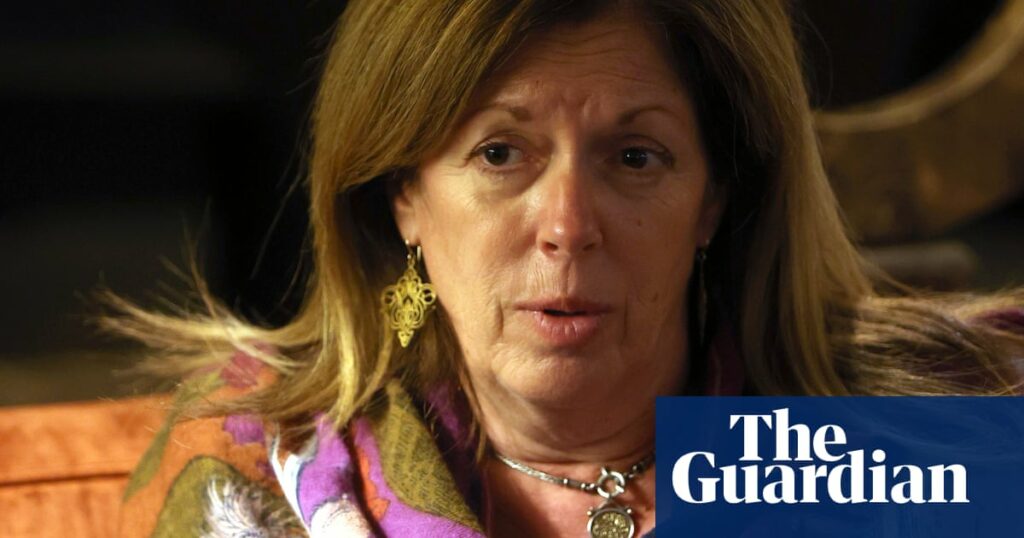Libya elite told to end ‘game of musical chairs and focus on elections’

Show caption Stephanie Williams: ‘This is ultimately a struggle over assets, power and money.’ Photograph: Anadolu Agency/Getty Images Libya Libya elite told to end ‘game of musical chairs and focus on elections’ UN special adviser Stephanie Williams warns of resurgence of Islamic State if country is divided Patrick Wintour Diplomatic editor Sun 30 Jan 2022 17.01 GMT Share on Facebook
Share on Twitter
Share via Email
Libya’s political class should stop conducting musical chairs to stay in power and focus instead on preparing for nationwide elections to be held by June, the special adviser to the UN secretary general has said.
Stephanie Williams also warned of a possible resurgence of Islamic State if Libya were to fall back into total division.
Libya failed to hold elections for a president and parliament on 24 December partly due to rows over the eligibility of three controversial candidates, but also a wider fear that armed militia across the country would not accept the result if their candidate lost.
In the ensuing month divisions have worsened, as Libya’s parliament, the House of Representatives (HoR), prepares to install a government to rival the UN-recognised Government of National Unity (GNU). The HoR says the GNU’s mandate expired on 24 December.
Williams told the Guardian in an interview: “My fear is that some people may now manoeuvre for a prolonged period of delay. The HoR exists off a mandate that it was given in elections 3,700 days ago. It has been seven years, seven months since Libya went to the national polls. The other chamber, the High State Council, was elected 10 years ago. Their shelf life has long expired. This is ultimately a struggle over assets, power and money. That is quite a motive to hang on.
“I want the HoR as quickly as possible to set out a credible political process that answers the question that almost 3 million Libyans have asked, which is: what has become of our elections? It is entirely possible for the HoR to put elections back on track, and for an electoral event to happen by June.
“Instead they have turned their attention to the musical chairs game, and the formation of a new government to replace the GNU. Before discussing a new government whose mandate would be unknown, the HoR should set an election date.”
Williams said: “There is a thirst for elections – nearly 2.5 million collected their voting cards and in the city of Benghazi alone 800 people came forward to stand in the parliament. There is another new generation of Libyans that want to exercise their political rights.”
She added: “Elections can be part of a broader process of national reconciliation, particularly in countries where there has been no elections for a long time and there is an entrenched political elite who have had their noses in the trough for a long time.”
Abdul-Hamid Dbeibah speaks during a military graduation ceremony in Tripoli this month. Photograph: Mahmud Turkia/AFP/Getty Images
She said she was ready to sit down immediately with the two chambers to hammer out a constitutional basis for the elections.
Williams warned the possible formation of two governments in the country could be dangerous. The power vacuum last week led to the re-emergence of Islamic State in the south of the country, and an attempt on the life of the minister of justice.
“The spectre of the black flag in the south being raised is something we are all very worried about, and already several Libyan National Army soldiers were killed last week,” she said.
The elections set for 24 December never happened partly due to conflicting rulings by Libyan courts on the eligibility of three candidates – Gen Khalifa Haftar, the head of the Libyan National Army, Saif al-Islam Gadaffi, the son of the former Libyan dictator, and Abdul-Hamid Dbeibah, the head of the GNU. The international criminal court is inquiring into the first two while Dbeibah set aside a pledge that he would not stand in the elections, a precondition that had been set for anyone running the interim government.
Williams said “it was not for the UN to decide which candidates stood. It is entirely a Libyan decision.” But she added: “You would have to ask Dbeibah what he thinks of a violation of a moral pledge.”
She also called for the wings of the GNU, including its budget, to be clipped before it was replaced by an elected body. “The intention endorsed by the UN was for the GNU to be a small technocratic government to deliver services to the municipalities, to prepare for the elections, deal with the Covid crisis and restore electricity. That required only a modest budget.”
She also called for the merger of Libya’s two central banks, but said this had to be accompanied by complete transparency, a criticism of a previous UN decision last year not to publish a UN-commissioned Deloitte review of the bank’s finances. She said: “Implementation of the merger of the two banks has to be conducted with total transparency. The distribution and management of oil revenues in the country has long been a key driver of this conflict, so need full transparency.”
Williams’ own future as special adviser has been in question since Russia at the UN in New York last week refused to renew the mandate of the UN mission to Libya until a new special envoy was appointed. The mandate expires at the end of this month. Williams, an Arabic-speaking US diplomat, served in 2020 as acting director of the UN’s Libya mission after previously being its deputy director.
She was persuaded to come out of retirement after her Russian-backed successor, Jan Kubiš, a Slovak, resigned under a welter of criticism. The UN secretary general appointed Williams as his special adviser in early December in part to circumvent Russian objections to her appointment.
